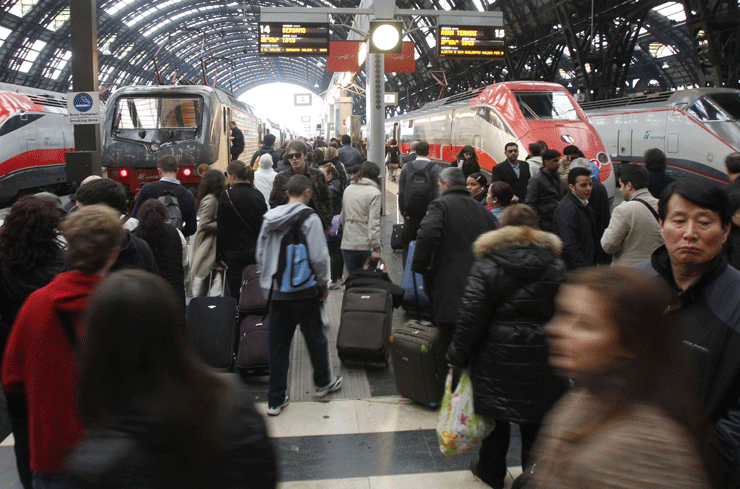Volcano
Moves More
Than Air Cargo

 So
much for the romance of the railroad. So
much for the romance of the railroad.
Rail travel in Europe is light-years ahead
of its American counterpart, but the activity resultant of the volcano
in Iceland is starting to even the pace betwixt the two.
“Now just back from a short break
in the south of Italy,” writes Heide Enfield, Head of Global Market
Development, Lufthansa Charter in Frankfort.
“The trip across a relatively short
distance was an odyssey – a 24-hour train ride, as there was no
chance of getting back by air.
“Getting a railroad ticket was tough
to say the least, never mind securing simple point-to-point service,
due to the crush of everybody trying to go someplace at once.
‘But being inventive (so I thought),
I boarded the night train from Lecce to Milano, a journey that took
12 hours, and then from Milano I took another coach to Zurich and finally
another train to Frankfurt.
“Milano Central Station looked like
a scene from an old war movie when an evacuation order has been issued,
with thousands of people in the station queuing for tickets and running
over the tracks with their luggage in desperate hope of securing passage
on northbound trains as they rolled down the tracks into the building.
“Loudspeakers were blaring almost
non-stop announcements that all northbound trains were booked until
Friday (April 23), which made people even more desperate and aggressive.
“The situation became even more
acute as railroad personnel tried to stop people from running over the
tracks, most nearly getting knocked over in the shuffle.
“It’s hard to describe the
sense of angst when I only had to get back to Germany, being in a place
with desperate people trying to get home to places like Moscow or England.
“I met a couple with two small children,
traveling from Rome to London.
“With all trains booked, they found
a way to get home by taking six or seven different trains that they
hoped would land them safely after a three day journey.
“The impressive thing, and actually
what I took away from all of this, was the sense of frustration on one
hand and the quiet calm and determined reserve of people like those
parents with their kids.
“Everybody’s world had been
turned upside down by a sudden and unforeseen event a thousand miles
away.
“Back in my flat in Neu-Isenburg,
I felt a bit like Dorothy clicking her heels together whilst repeating:
“There’s no place like home.”
Latest News:
Panalpina said it flew its B747 Dixie Jet from
Huntsville to Zaragoza Spain today, restoring service on its 5-day a
week Transatlantic service that usually goes from Huntsville to Luxembourg.
The freighter was met by a convoy of trucks
that moved the goods to Panalpina’s Luxembourg hub for further
distribution across multiple European destinations via Panalpina’s
Road Feeder network.
Lufthansa is moving intercontinental flights out of
various German airports, many of them bound for the U.S. with some domestic
and intra-European routes.
Air France said it is operating all of its
regularly scheduled long-haul flights out of Paris on Tuesday.
“There cannot be any compromise on safety,”
said Siim Kallas, the European Commission’s Vice President for
Transport.
"All our assessments … are based
on expert decisions, decisions of independent bodies and science,"
he said, noting that, “the situation remains fluid.”
"The analysis we have done so far, alongside
that from other airlines' trial flights, provides fresh evidence that
the current blanket restrictions on airspace are unnecessary,"
said British Airways CEO Willie Walsh, who participated Sunday in a
test flight from London to Cardiff, Wales told reporters.
"Our assessment is that the risk has been
minimal and can be managed by alternative procedures to maintain the
highest [safety] standards."
In the meantime, in what may be the biggest
mainland Europe evacuation since Dunkirk, Britain said that it would
send three naval warships to bring home its citizens, including soldiers
stuck in Spain after a tour of duty in Afghanistan.
Geoffrey/Flossie
|
